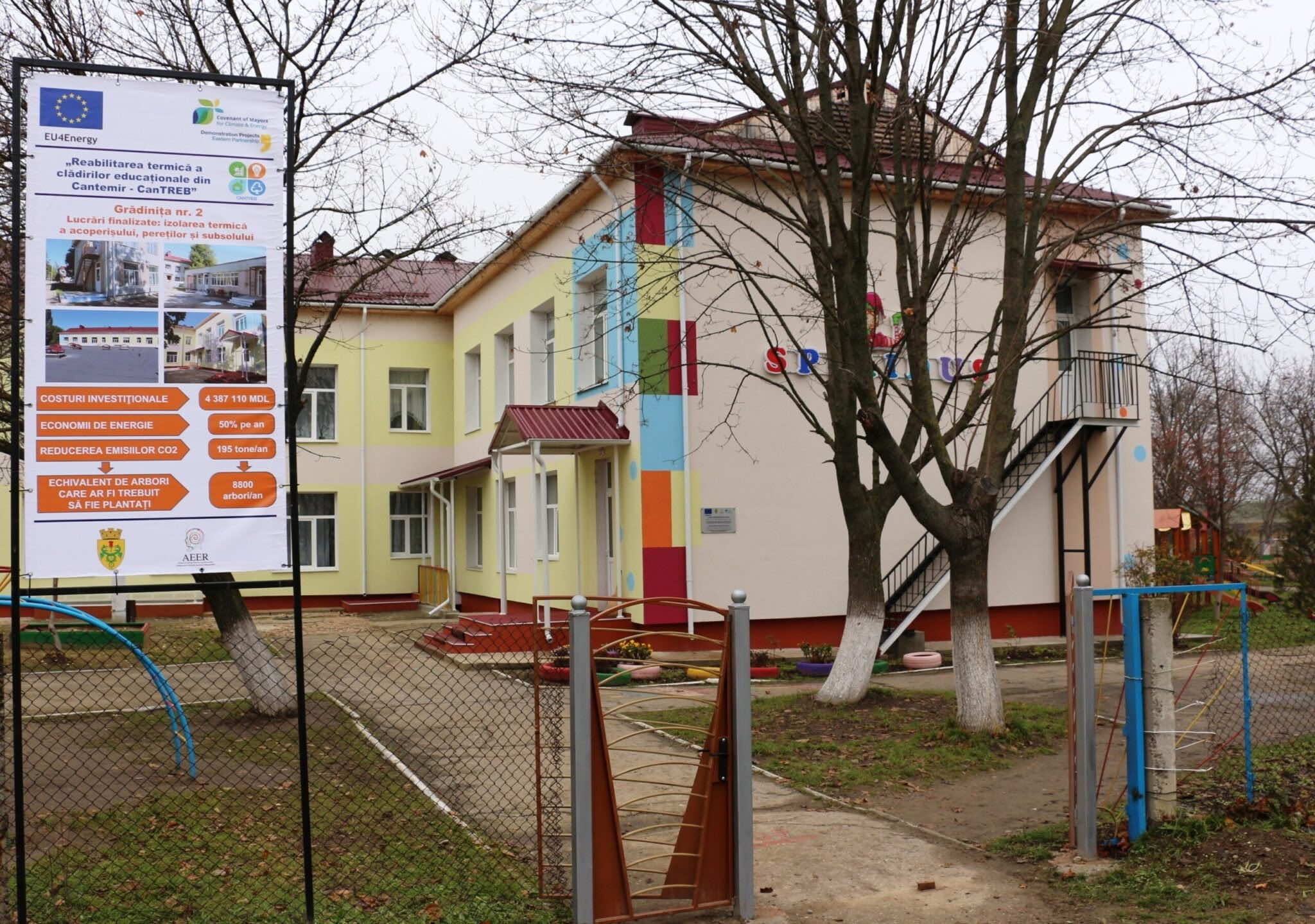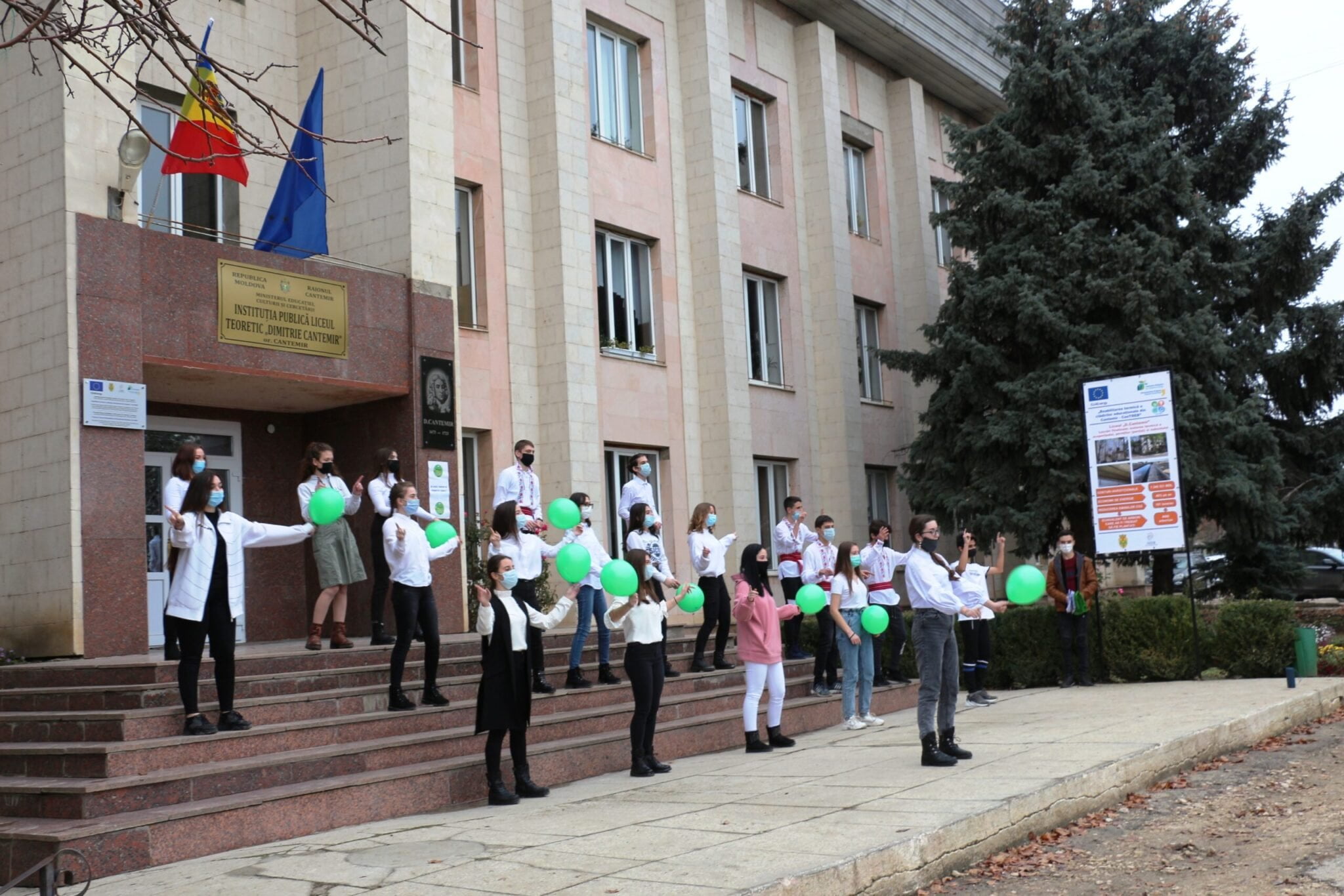Two more educational buildings in the town of Cantemir have been thermally rehabilitated with the European Union’s support. The investments were made at the Kindergarten no. 2 and the Lyceum “Dimitrie Cantemir”, in compliance with the high European standards of energy efficiency, improving the conditions of comfort and health of about 360 children.
The kindergarten building was built in 1988 and required renovation and thermal refurbishment for a long time now. The changes started in 2018 with the large-scale EU-funded project: “Thermal Rehabilitation of Educational Buildings in Cantemir – CanTREB” implemented within the Covenant of Mayors Demonstration Projects framework. The building put on “new clothes” thanks to the insulated external walls, roof, and basement to reduce heat losses from the building. Special attention was paid to the use of high-quality materials and the best EU practices on thermal insulation of buildings. Thus, the walls and roof were insulated with 150mm thick mineral wool. Implemented measures will significantly reduce the cost of heat energy required to maintain a comfortable temperature in buildings and better adapt to climate change conditions.

Another series of thermal insulation works were performed at the Lyceum “Dimitrie Cantemir”, located in the city center. Following energy audit recommendations, partial thermal insulation was made here, including the unheated part of the basement, roof, and the external wall adjacent to the conference hall and the school’s gym, which was especially cold. Particular attention was paid to the insulation of the parapet. This measure will help to avoid cold bridges and, as a result, will help protect the school premises (classrooms on the upper floor) from the mold.

The expected savings of heat energy as a result of these measures is 40-50%. Experts say that the project will also have a positive environmental effect by reducing CO2 emissions by 300 tons annually.
The total investment cost for the two buildings is 288,597 euros.
Present at the event, Mr. Gintautas Baranauskas, Deputy Head of Cooperation at the EU Delegation to the Republic of Moldova, stated: “I am particularly proud to witness the excellent results of this EU funded project in Cantemir. Thanks to EU funding, this thermal rehabilitation works will improve the quality of life for more than 360 students and their teachers and citizens overall. Energy Efficiency measures will deliver better comfort to students as well as save important economic resources while at the same time contributing to addressing climate change. To this extent, I would like to congratulate and thank the implementing team and the local authorities and citizens that demonstrated a strong commitment and ownership”.
“The thermal rehabilitation of the Kindergarten brought more comfort and immense happiness for all 160 children, their parents, and, last but not least, for all employees of the institution.” said Viorica Diacov, the director of Kindergarten no.2 from Cantemir”.
“This investment was very much necessary, the institution not having the capacity to perform such works. Thanks to the European Union and the local contribution, we follow EU energy efficiency standards,” said Elena Macaria.
“The project on thermal rehabilitation of educational buildings in Cantemir helps us to implement the Action Plan on Sustainable Energy and to achieve the objectives of reducing CO2 emissions, assumed by Cantemir Town Hall within the Convention of Mayors for Climate and Energy,” said Roman Ciubaciuc, the Mayor of Cantemir.
The CanTREB project is carried out by Cantemir City Hall, in partnership with the Alliance for Energy Efficiency and Renewables (AEER), with the European Union’s financial support, within the” Covenant of Mayors – Demonstration Projects” Programme. The project provides for the thermal rehabilitation of 4 public educational buildings through a complex of energy efficiency measures, such as thermal insulation of facilities, installation of the individual heating station, replacement of internal lighting system with LED, installation of the biomass plant, installation of photovoltaic systems and solar collectors, etc.